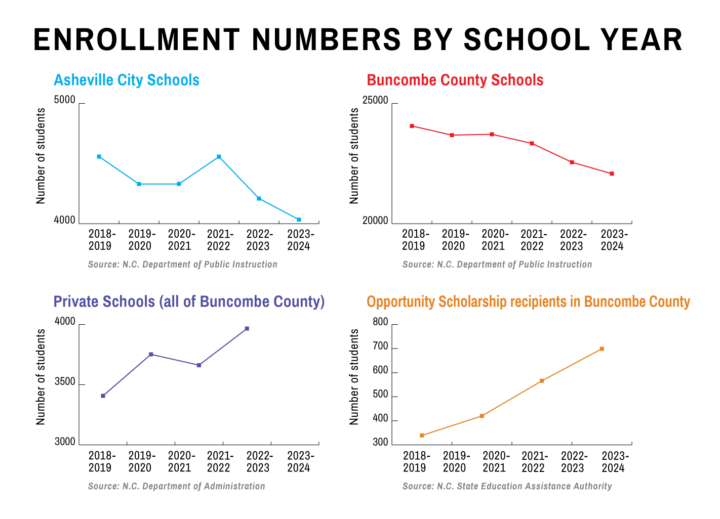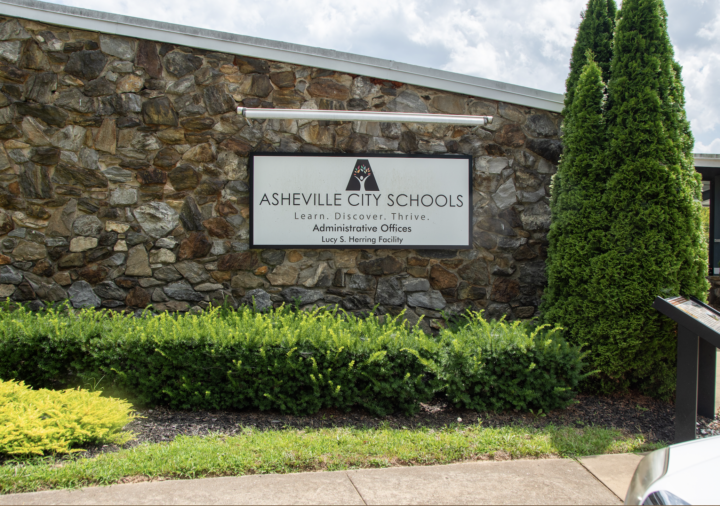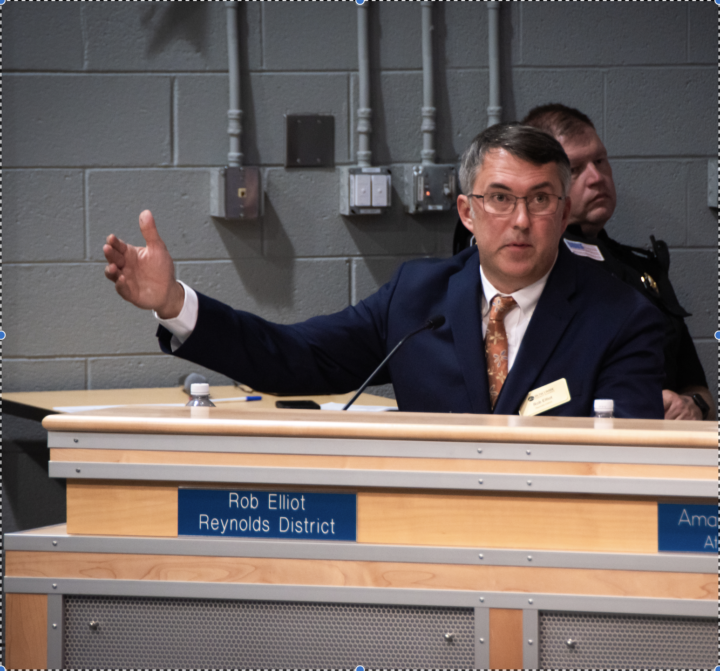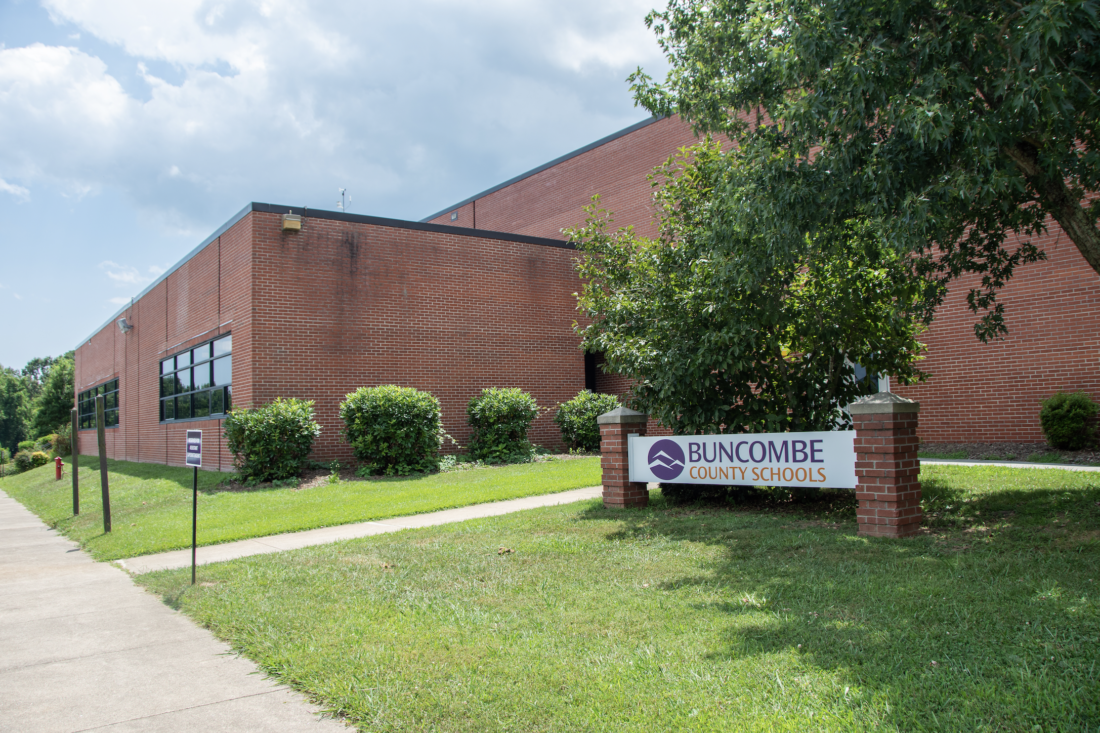Private schools likely will become more affordable for families of any income next school year at the expense of public schools. The N.C. General Assembly is set to pass what amounts to a veto-proof bill removing the income cap for the private school voucher program.
Buncombe County’s two public school districts could be out a combined $5.6 million in fiscal year 2026-27 if the expansion of the state’s Opportunity Scholarship program passes, according to an estimate from the Office of State Budget and Management.
That total could go up in subsequent years as the state’s investment in the private school voucher program rises from about $133.8 million last year to more than $400 million in fiscal year 2024-25, according to Senate Bill 406. The spending will increase annually, hitting a $520 million maximum in fiscal year 2032-33.
“I am deeply concerned about what allocating more taxpayer dollars to private education will do to our K-12 public education system in North Carolina. We see teachers and principals leaving North Carolina to go to states that respect public education and educators and pay more. This ultimately comes at the expense of our kids,” says Buncombe County Commissioner Amanda Edwards, who is the mother of a rising senior at Asheville High School. Edwards’ husband, Derek Edwards, is the principal of Asheville High School.
Alternatively, some local parents favor the voucher program because they say private schools can provide a unique curriculum or social setting that is a better fit for their child than public schools that are subject to state standards for testing and approved teaching styles.
Opportunity Scholarships
Currently, families can apply for a private school voucher — called Opportunity Scholarships — for private school tuition if they are accepted to a participating private school and fall below certain income levels, which has helped some Buncombe students attend their schools of choice.
The bill removes the income eligibility cap, allowing anyone, no matter their income, to apply for state funds for private school education, as long as at least 50% of total funds go to children whose families qualify for free and reduced-price school meals.
Families will receive funding on a sliding scale based on their income levels, with the maximum being the state average per-pupil allotment that goes to public schools, or about $6,500. The state funds schools based on attendance, so if students migrate to private schools using vouchers, the corresponding public districts lose funding.
Of Buncombe’s 35 private schools, 23 have signed up to receive the scholarship funding.
The new law also expands eligibility in another way. Under the current law, students were eligible for the scholarship the first year they attended a private school, regardless of grade level. A student could apply for the scholarship each year following. Under the new law, even students who have attended private schools for several years are eligible for the scholarships. That would mean the state will pay money to families that have been able to pay for their children’s education out of pocket.
Opponents argue that amounts to the state cutting a check to wealthy families with money that would otherwise be allocated to public education.
Public school advocates in Buncombe County, from administrators and politicians to teachers and parents, say schools are already starving. A 2004 Supreme Court ruling commonly referred to as “Leandro” — reaffirmed in 2022 — asserted that the lack of education funding meant “the State had failed in its constitutional duty to provide certain students with the opportunity to attain a sound basic education.”
According to a 2022 report from the Education Law Center, North Carolina ranked last in the country in education funding as a percentage of the state’s gross domestic product.
“The needs of public schools are so clear, and continuing to not meet those needs, while funding millionaires who are already sending their kids to private school makes absolutely no sense,” says state Sen. Julie Mayfield, who represents the western half of Buncombe County, including Asheville.
The Senate bill is likely to become law because the Republican supermajority has the power to override a likely veto from Gov. Roy Cooper, Mayfield says.
‘Triage mode’
In the last 10 years, both Buncombe school districts have seen shrinking attendance numbers and therefore shrinking funding. The Buncombe County Schools district, in particular, has lost more than 12.5% of its students and $30 million in state funding in the last 10 years.

Asheville City Schools numbers have fluctuated more but are down 2.8% over 10 years and are projected to lose another 4% just this year, according to an Xpress analysis.
If projections for 2023-24 from the N.C. Department of Public Instruction are correct, BCS will have its lowest attendance since at least 1996-97, and ACS will be at its lowest point since 2011-12. District counts do not include public charter schools, which operate independently of the traditional public school districts but receive state funding.
Meanwhile, private school attendance in Buncombe was up 25% in 2021-22 over 2013-14, the year before the Opportunity Scholarship program began.
“We’re already kind of in a triage mode,” says Buncombe County Board of Education member Rob Elliot of the school districts.
That loss of funding means school administrators have to consider what services to cut. Whether it’s elective offerings from arts to athletics or student services such as mental health counselors, there are no good options, Elliot says.
“In the midst of a mental health crisis where we need to be as close as possible to the recommended ratio of school counselors and school social workers, we have to keep cutting them. We have to, but it’s those student services that are really critical,” he says.
“There’s no doubt that given the laws that the state has created around charter schools and around the voucher system … that families who have the resources to go somewhere else can figure out a way to go somewhere else,” says George Sieburg, chair of the Asheville City Schools Board of Education. “And the shame of it is that it comes from a fundamental false narrative that our schools are a problem, which is not the case. Our schools do amazing things,” he adds.
Free rein vs. no accountability
Unlike traditional public schools, private schools have the ability to be more creative, free from having to meet state accountability standards for teacher certification and standardized testing scores. For some parents, such as Ellie Childs, that’s what makes them attractive. Childs says the public school’s teaching model is antiquated.
“That model, which fits into state standards, is really only addressing one learning style. And there’s multiple intelligence styles, multiple learning styles. A lot of people learn experientially and not through rote memorization,” she says.
The lack of accountability also means there’s no oversight of what is being taught on private school campuses. Many of the state’s private schools have a religious affiliation, and 92% of vouchers awarded in the Opportunity Scholarship program as of 2020 went to religious schools, according to an analysis conducted by Duke School of Law.
For public school advocates, that’s problematic.

“We could be using state dollars to support schools that actively teach discrimination against vulnerable communities, like minorities, like LGBTQ kids and families. I mean, that’s just unacceptable. It is absolutely 100% unacceptable. State dollars should not be going to schools that teach those things,” Mayfield says.
Additionally, unlike private schools, traditional public schools are charged with serving every student, including providing transportation and meals, which costs money, Sieburg says.
“Any public school system is serving every single person who comes to the door. Resources get stretched. And so yeah, for sure, in a small charter school or a small private school, where they can kind of, forgive the language, but pick and choose the families that are there, and what they want to teach, and what programs they want to have, they can be a little bit more nimble. But that doesn’t mean that the education that we provide at Asheville City Schools is any less than what they can provide. We have educators trained in the same way, and sometimes in even more complete ways than the educators at private schools and charter schools,” Sieburg says.
Who benefits from vouchers?
Opponents of the voucher program argue the scholarships provided aren’t truly enough to help lower-income people access pricey private schools, leading the scholarship money to just pad the pockets of families who can already afford a private school education.
In Buncombe County, private school tuition averages more than $18,000, nearly twice the statewide private school average tuition cost of about $9,700, according to privateschoolreview.com.
LeeAnna Rahim and her co-parent have not taken advantage of an Opportunity Scholarship thus far because they made too much money, but she said they might consider it under the pending law because tuition at Asheville Waldorf School has gotten untenable.
Rahim says her 11-year-old has thrived in the Waldorf curriculum since preschool. She is pulling her 7-year-old daughter out to attend FernLeaf Community Charter School, which has no tuition, and plans to transition her older daughter to FernLeaf after the upcoming school year as well to save money, she says.
Childs moved to Buncombe County from Colorado a year ago and used an Opportunity Scholarship to help her pay for her daughter to attend kindergarten at Odyssey School. She is attending the private Rainbow Community School this year, even though the scholarship only covers about half of her daughter’s tuition, she says.
“I strongly believe in alternative education and private schools, and it’d be great if they were all publicly funded. But if they were, then (they wouldn’t) be able to do anything that’s outside of the norm. So, I am very grateful that there is a scholarship for people that can’t afford private school,” Childs says.
‘Fiscally irresponsible’

Ultimately, Elliot, Sieburg and Mayfield all expressed support for school choice generally and said they understand there’s a place for private schools in the general fabric of our education system. But they all drew a line at sending public funds to private schools.
Elliot says it is fiscally irresponsible to take taxpayer dollars mandated by the state constitution to be spent on traditional public schools and hand them over to an unaccountable system.
“Once that money goes over to that private system, the public loses 100% of its voice and how that money is spent by that institution. That institution can take that tuition money and do with it whatever in the world they want to do,” he says.
Instead, Mayfield says, we should invest that money in an already starving public school system because that is what the state constitution mandates. (Specifically, it says, “The people have a right to the privilege of education, and it is the duty of the State to guard and maintain that right.”)
“Everybody should be offered the opportunity to get a good education, and the foundation in our country for that is our public schools,” Mayfield says.
Shanna Peele, Buncombe County Association of Educators president, says the voucher expansion program is another reason public school teachers feel as if they’re under attack.
“Why would the GOP leaders do this when the majority of North Carolina students are in traditional public education, and the (state Supreme Court), students, parents, teachers, school personnel and principals have all told us that those same traditional schools are being drastically underfunded?” she asks.



Perhaps I don’t understand the arithmetic. “In the last 10 years, both Buncombe school districts have seen shrinking attendance numbers and therefore shrinking funding. The Buncombe County Schools district, in particular, has lost more than 12.5% of its students and $30 million in state funding in the last 10 years.” Doesn’t it cost less to teach fewer students? If fewer students are going to public school and instead are going to private school, why can’t the $30 million reduction in state funding go to those students who choose private school if their parents perceive they are getting a better education in a private school?
Whatever it takes to get as many as possible out of the government controlled school realities that indoctrinate in such harmful ways! Wonderful that so many can now overcome the system of non choice !
Good gawd dude do you ever stop talking? Do you even have kids? I have worked in the schools and the only indoctrination I see is christian. Teachers praying and talking about Jesus Christ and wearing T-shirts that talk about god and the savior and all that BS. Give me a break. STOP CHRISTIAN NATIONALISM. Not what this country is supposed to be.